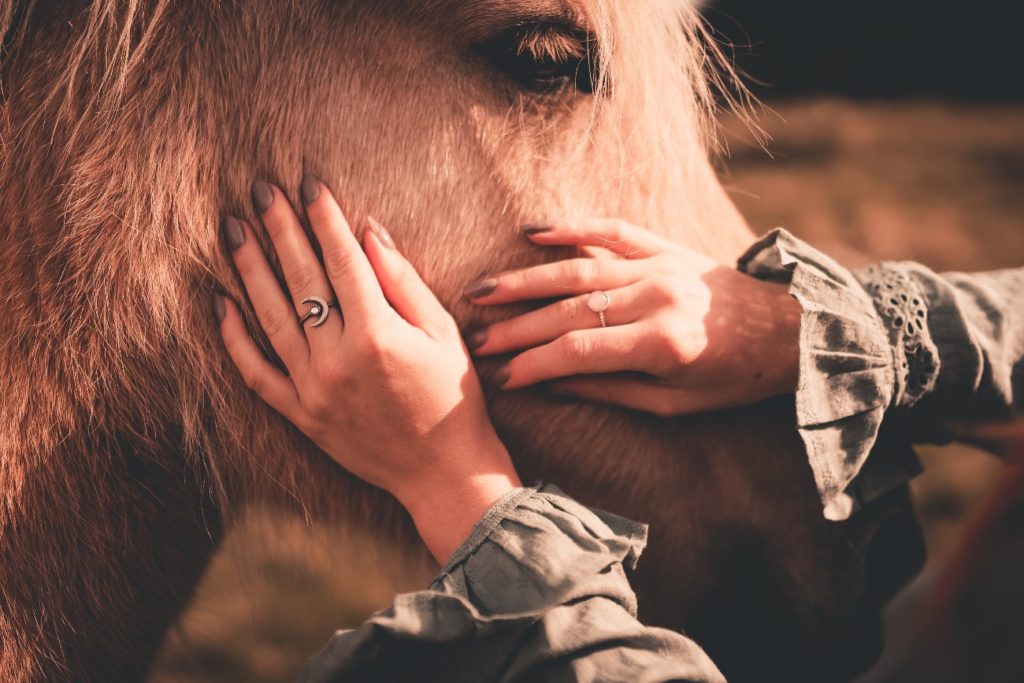Updated on 4/13/2023
Addiction recovery programs that utilize individualized treatment understand that every patient enters addiction treatment with unique needs and goals for their recovery. Most treatment facilities use traditional and complementary or holistic interventions in tandem to emphasize whole-body healing. One of these is equine therapy, which utilizes a connection between a patient and horses for personal growth and healing. This blog explores equine therapy further and shares its benefits, which include increased self-awareness, social skills and confidence.
Programs may utilize many complementary interventions to increase the overall effectiveness of treatment. One particularly valuable intervention is equine therapy. Becoming familiar with equine therapy as well as the benefits it can have on addiction recovery can help individuals make informed choices about treatment options.
Understanding Equine Therapy
Equine therapy, also known as equine-assisted therapy or EAT, is an experiential and evidence-based treatment approach that utilizes the connection between a patient and horses to enhance personal growth and healing. According to the journal Nursing Open, “Horses have demonstrated a therapeutic effect that has been supported with experimental intervention research.”
This journal explains that horses and other domesticated animals have been used to aid in treatment and healing since the second century. The Centers for Disease Control and Prevention (CDC) notes several benefits that can result from the bond between people and their pets, which include:
- Decreased blood pressure
- Decreased cholesterol levels
- Decreased feelings of loneliness and depression
- Decreased anxiety
- Decreased symptoms of post-traumatic stress disorder (PTSD)
- Increased opportunities for exercise and outdoor activities
- Increased cognitive function
- Increased opportunities for socialization
Facilities that offer experiential therapies like EAT understand that not every patient wants to sit down and talk through their trauma in a therapist’s office. Equine therapy removes patients from the typical office setting and out into a more natural environment. There, they can learn how to address their substance use and other traumas hands-on.
What to Expect From an Equine Therapy Session
When an individual participates in equine therapy, they can expect to work one-on-one with trained horses and learn how to care for them. Contrary to what one may think, patients often do not ride horses during equine therapy. Instead, the patient will interact with them from the ground under the supervision and guidance of a therapist.
Dr. Shannon Sisco, a whole health coordinator at the Houston VA, explains, “The challenge in equine therapy is to develop a trusting relationship with your horse, which in many ways brings out lessons about our own relationships and helps us learn new ways of being in them.” During sessions, a patient can grow their relationship with a horse through petting, grooming, leading, feeding and talking with them. Following sessions, individuals participating in equine therapy usually meet together as a group to process their experiences. They reflect on the thoughts, feelings and behaviors that surfaced throughout the session and explore and share new insights and perspectives.
The Benefits of Equine Therapy for Addiction Recovery
Equine therapy can have many benefits for addiction treatment and recovery. Here are a few examples:
Fosters Social Skills
When an individual struggles with SUD, their interpersonal relationships are inevitably affected. In recovery, patients must work to build their social skills, especially communication.
Equine therapy fosters social skills by allowing a patient to learn how to recognize emotional changes in their horse. Horses are very perceptive and reactive to human emotion. If the human caring for the horse is stressed or irritable, the horse will be, too. Additionally, horses take a lot of time and patience to care for. They have many needs that the patient can attend to.
Therefore, as patients learn to care for their horse, they learn how to take better care of themselves. Learning how to process sensory information and nonverbal cues is essential for developing positive social skills. Equine therapy gives patients an opportunity to learn these cues and skills at their own pace.
Strengthens Self-Confidence
SUD negatively impacts an individual’s self-worth and self-esteem. In recovery, patients must learn how to strengthen their self-confidence. Developing self-confidence not only helps with establishing one’s sobriety but also helps one to persevere beyond future challenges, ultimately preventing relapse in the long term.
Equine therapy helps strengthen patients’ self-confidence because horses are nonjudgemental and unbiased. They do not hold an individual’s past mistakes or physical appearance against them. The horses only react to the patient’s behavior and emotions in the present moment. Likewise, patients can grow their confidence by growing their relationship with their horse and appropriately tuning in to their horse’s needs.
Improves Self-Awareness
Addiction changes how individuals view themselves. In other words, their addiction can corrupt their self-image. Treatment must help individuals improve their self-awareness so they can make healthy decisions that align with their recovery goals.
Equine therapy helps improve patients’ self-awareness as they explore their relationship with their horse. During group discussions following equine sessions, individuals can share insights about how specific interactions with their horse made them feel. Individuals are encouraged to reflect deeply on these experiences and learn how different situations affect their own emotions and behaviors. As a result, they can learn to approach others with kindness and respect in hopes that others will do the same to them.
Prevention and Recovery Center (PaRC) is a treatment facility that understands the incredible value complementary interventions can add to one’s overall addiction treatment and recovery process. We offer a number of holistic and experiential interventions, including equine therapy, to foster greater opportunities for our patients throughout treatment. We have seen the effectiveness of equine therapy first-hand and know the benefits it can have on your recovery. To learn more, call (713) 939-7272.
